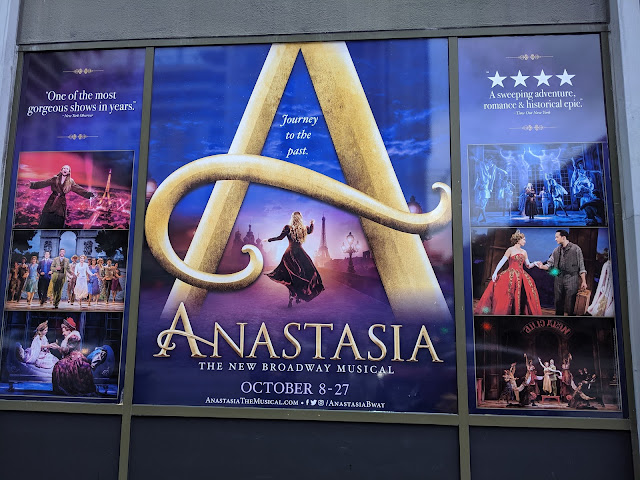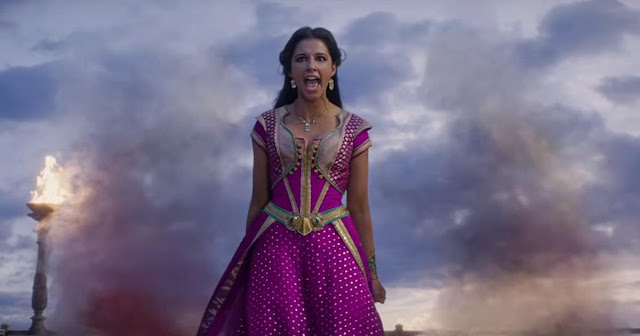Review: Anastasia The Musical
In general, I find that animated movies don't translate well the stage even though they have musical numbers that seem perfect for Broadway. Disney shows such as Aladdin often miss the point of having an additional hour to develop the characters and squander the time on extra dance numbers that are completely unnecessary to the plot. In the case of Anastasia, which was not produced by Disney, they cut a major character from the 1997 Don Bluth masterpiece. Rasputin, the movie's chilling undead villain, was replaced by a more sympathetic antagonist named Gleb, a Russian revolutionary. They most likely did this for the sake of historical accuracy and because it would have been difficult to portray a rotting corpse on stage. "In the Dark of the Night" is one of my favorite villain songs of all time, so Rasputin's absence was very noticeable when I attended the final performance of the Anastasia tour at the Pantages Theatre in Hollywood.
Anastasia is one of my favorite movies of all time, so it would be difficult for any adaptation to rival the original. I must not be alone in thinking this because the show ended its three-year Broadway run this past March. The play isn't so bad if you've never seen the movie. The musical numbers are entertaining enough, and the second act is extremely touching. The ballet scene at the opera house is pure magic. However, the story lacks any true conflict due to the lack of a good villain. In the original Anastasia, Rasputin invaded Anya's dreams and sent scary green minions from Hell after her before ultimately defying the laws of physics in an attempt to take her life and complete his vow to end the monarchy. In contrast, Gleb spends most of the musical adaptation sitting around an office and singing about how he needs end the monarchy because his father wanted him to, even though that might not really be what he wants. His inner conflict makes him a fascinating character, but a boring villain.
From a technological standpoint, Anastasia is more dependent on projections for its sets than any other Broadway show I've seen. This might be because I haven't seen another show that came out after 2016. I certainly hope CGI projections are not the future of theater. Practical sets are so beautiful and creative that it's a shame to virtually erase them just because LED screens are easier to produce nowadays. I felt the same way about the CGI backgrounds in the new Frozen show at Disneyland in comparison to the gorgeous practical sets of Agrabah from their retired Aladdin show. There some set pieces in Anastasia for the actors to interact with such as a fountain in St. Petersburg or a chair in Gleb's office, but just about everything behind the characters was projected on a screen. The only set piecethat seemed even a little creative was the train, which was a rotating steel frame skeleton that allowed the audience to see inside of it from all angles.
Rasputin aside, the story was pretty similar to the original film. Anya, an orphan with very few memories of her past, teams up with Dmitry and Vladimir to go to Paris and figure out if she is the Grand Duchess Anastasia. Anya's pet Pooka was cut as well, which makes sense since it's hard to have animals onstage. Still, without Pooka pointing her in the right direction or her "Together in Paris" necklace, it makes little sense that she would want to go to Paris based on a vague whim that she might find a clue to her past there. Dmitry is cruel to her at first, and her trust in him seems ill-placed. Their romance reaches a turning point in the second act with their duet "In a Crowd of Thousands," where they remember seeing each other as children. Vladimir still has his love interest, Sophie, but her name was changed to Lily, and she is now the Dowager Empress's lady-in-waiting.
Overall, Anastasia is a decent play, but it does not hold a candle to the magic, wonder, and romance of the 1997 movie, which is now owned by Disney. I can understand why its Broadway run was cut short. The lack of a strong villain like Rasputin removes most of the suspense and conflict from the story. The projected backgrounds felt like lazy way to avoid building elaborate sets. I only found them useful when they created the illusion of snow outside the windows and portrayed the current year in the play. The only scene that I felt truly recreated the enchantment of the animated movie was when all of the major characters watched a performance of "Swan Lake" and sang about how everything would change when Anya meets the Dowager Empress and truly becomes Anastasia. Perhaps they were right to think that change can be dangerous because in this case, Anastasia would probably have been better off left alone.
Anastasia is one of my favorite movies of all time, so it would be difficult for any adaptation to rival the original. I must not be alone in thinking this because the show ended its three-year Broadway run this past March. The play isn't so bad if you've never seen the movie. The musical numbers are entertaining enough, and the second act is extremely touching. The ballet scene at the opera house is pure magic. However, the story lacks any true conflict due to the lack of a good villain. In the original Anastasia, Rasputin invaded Anya's dreams and sent scary green minions from Hell after her before ultimately defying the laws of physics in an attempt to take her life and complete his vow to end the monarchy. In contrast, Gleb spends most of the musical adaptation sitting around an office and singing about how he needs end the monarchy because his father wanted him to, even though that might not really be what he wants. His inner conflict makes him a fascinating character, but a boring villain.
From a technological standpoint, Anastasia is more dependent on projections for its sets than any other Broadway show I've seen. This might be because I haven't seen another show that came out after 2016. I certainly hope CGI projections are not the future of theater. Practical sets are so beautiful and creative that it's a shame to virtually erase them just because LED screens are easier to produce nowadays. I felt the same way about the CGI backgrounds in the new Frozen show at Disneyland in comparison to the gorgeous practical sets of Agrabah from their retired Aladdin show. There some set pieces in Anastasia for the actors to interact with such as a fountain in St. Petersburg or a chair in Gleb's office, but just about everything behind the characters was projected on a screen. The only set piecethat seemed even a little creative was the train, which was a rotating steel frame skeleton that allowed the audience to see inside of it from all angles.
Rasputin aside, the story was pretty similar to the original film. Anya, an orphan with very few memories of her past, teams up with Dmitry and Vladimir to go to Paris and figure out if she is the Grand Duchess Anastasia. Anya's pet Pooka was cut as well, which makes sense since it's hard to have animals onstage. Still, without Pooka pointing her in the right direction or her "Together in Paris" necklace, it makes little sense that she would want to go to Paris based on a vague whim that she might find a clue to her past there. Dmitry is cruel to her at first, and her trust in him seems ill-placed. Their romance reaches a turning point in the second act with their duet "In a Crowd of Thousands," where they remember seeing each other as children. Vladimir still has his love interest, Sophie, but her name was changed to Lily, and she is now the Dowager Empress's lady-in-waiting.
Overall, Anastasia is a decent play, but it does not hold a candle to the magic, wonder, and romance of the 1997 movie, which is now owned by Disney. I can understand why its Broadway run was cut short. The lack of a strong villain like Rasputin removes most of the suspense and conflict from the story. The projected backgrounds felt like lazy way to avoid building elaborate sets. I only found them useful when they created the illusion of snow outside the windows and portrayed the current year in the play. The only scene that I felt truly recreated the enchantment of the animated movie was when all of the major characters watched a performance of "Swan Lake" and sang about how everything would change when Anya meets the Dowager Empress and truly becomes Anastasia. Perhaps they were right to think that change can be dangerous because in this case, Anastasia would probably have been better off left alone.













Comments